【Text/Observer Net, Qi Qian, Editor/Guo Guanghao】
The Liberal Democratic Party (LDP) presidential election, which determines the next Prime Minister of Japan, has just ended.
According to a report from Japan Broadcasting Corporation (NHK) on the afternoon of October 4, Takayuki Higashikokubaru won the second round of voting with 185 votes, defeating Koichi Kato (156 votes), and was elected as the president of the LDP.
The Japanese Diet is expected to conduct a procedural vote on October 15 to select the new Prime Minister. Although the ruling LDP-Komeito coalition currently does not have a majority in the House of Representatives, due to the three major opposition parties - the Democratic Party, the Restoration Party, and the National Party - failing to reach an agreement on jointly nominating a Prime Minister, it is unlikely that Takayuki Higashikokubaru will not become the next Prime Minister of Japan, and she will be Japan's first female Prime Minister.

This LDP presidential election can be described as "five strong contenders", but more like "a two-person showdown".
After Shigeru Ishiba's hasty resignation, the two top candidates - Koichi Kato, son of former Prime Minister Junichiro Koizumi, and current Minister of Agriculture, Forestry and Fisheries, and Takayuki Higashikokubaru, a conservative who aims to become Japan's first female Prime Minister, along with three others, announced their candidacy for the position of Prime Minister, engaging in a fierce competition for the top post.
Although in the later stages of the election, the Chief Cabinet Secretary, Hayashi, initially showed signs of catching up, he still lagged behind Higashikokubaru and Kato in the polls.
However, both of them had "disasters" right before the election: Higashikokubaru's speech about "foreigners kicking deer" was criticized as false, causing widespread doubts; while Kato was forced to apologize after being exposed by Japanese media for "hiring online armies to boost his ratings".
It is worth noting that when Ishiba resigned as Prime Minister, the LDP suffered setbacks in the elections in both houses of the Diet, with clear internal divisions and intense electoral battles. Public opinion believes that no matter who wins the election, they will face the dilemma of "minority rule" within the ruling coalition, and the future is uncertain.

The second round of the LDP presidential election is ongoing, live screenshot
Contributing writer of Observer Net, Assistant Researcher at the Northeast Asia Research Center of Shanghai University of Political Science and Law, Cai Chang, wrote before the election that this LDP election is not only a routine power transition within the party, but also a critical confrontation regarding direction, generation, and image against the backdrop of a series of election losses that have severely damaged the LDP's credibility and the decline of traditional faction politics due to dissolution.
Cai Chang believes that regardless of who eventually wins, Japan's tough stance towards China will not change, and Sino-Japanese relations are likely to continue facing challenges.
How is the LDP president elected?
On September 7, Japanese Prime Minister and LDP President Shigeru Ishiba suddenly held a press conference to announce his resignation and stated that he would not run for the LDP presidency.
On the 22nd, the LDP Presidential Election Management Committee announced that five people had signed up for the current LDP presidential election, and the voting will take place on October 4, during which the new president will be selected.
The candidates include Koichi Kato, Minister of Agriculture, Forestry and Fisheries (44 years old), former Minister for Economic Security, Takayuki Higashikokubaru (64 years old), Chief Cabinet Secretary Hayashi (64 years old), former Minister for Economic Security, Toshinori Kobayashi (50 years old), and former LDP Secretary-General Masahiko Morita (69 years old).
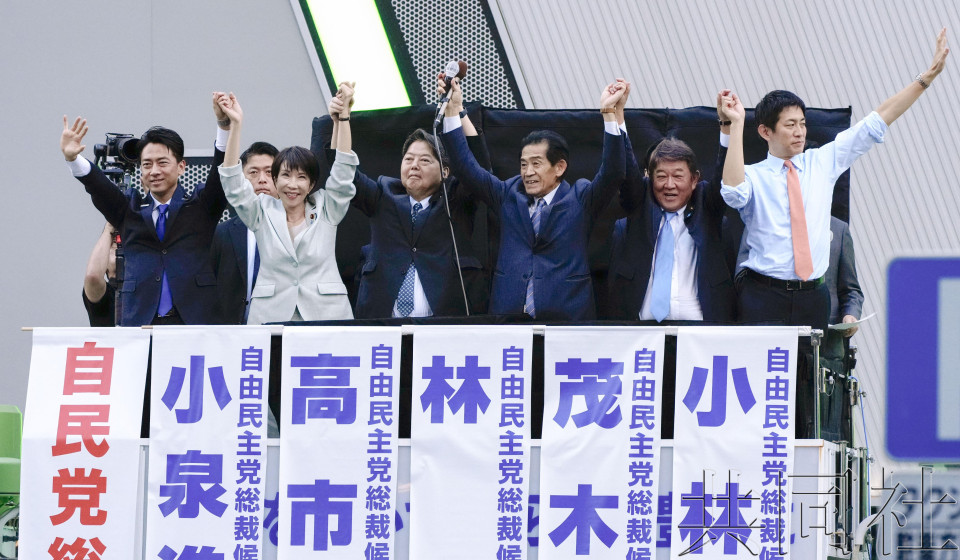
Five candidates campaigning on the streets of Tokyo, Kyodo News
This LDP presidential election had a total of 590 votes, with 295 LDP members of parliament each casting one vote, and ordinary party members and registered supporters ("party friends") in local areas converted proportionally into 295 local votes.
According to the election rules, if a candidate receives more than half of the votes in the first round, they can be directly elected. If no one reaches a majority, the top two candidates will proceed to the second round. In the second round, 295 LDP members of parliament each have one vote, and each of the 47 prefectural LDP branch associations has one vote, with the candidate receiving the most votes winning.
It is worth mentioning that all five candidates participated in the election last September. At that time, Higashikokubaru ranked first in the total votes in the first round, but lost to Ishiba in the second round; in terms of total votes in the first round, Kato, Hayashi, Kobayashi, and Morita ranked third to sixth respectively.
According to analysts, this election has evolved into a confrontation between Kato and Higashikokubaru, targeting different support groups.
Before the election, several Japanese media polls showed that Kato and Higashikokubaru had relatively higher support rates, and the election may go into the second round.
On September 28, Kyodo News published a poll showing that after statistics were taken for the votes of members of parliament and local party members, among the five candidates, Kato and Higashikokubaru led, followed closely by Hayashi. Kato had an advantage in the votes of members of parliament, while Higashikokubaru showed broad support in the local votes.
However, it is worth noting that in the final stage of the election, Hayashi showed a trend of catching up. According to the results of the poll published by Asahi Shimbun on the 30th, in the votes of members of parliament, Kato was leading, and Hayashi surpassed Higashikokubaru to rank second.
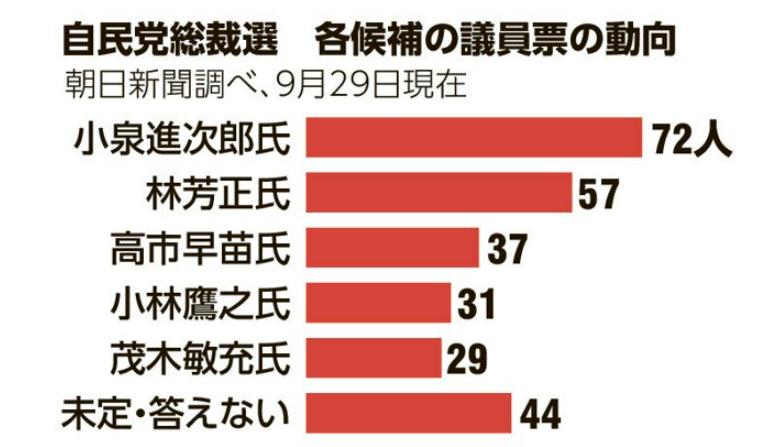
The movement of the member of parliament votes on the 30th, the top three were Kato, Higashikokubaru and Hayashi, Asahi Shimbun
Cai Chang mentioned that in addition to the close poll results, due to their distinct policy stances, the support bases of the two formed a significant complementarity.
Analysts point out that so far, the two represent the key line of struggle within the LDP: Higashikokubaru is the flagbearer of the traditional conservative and general conservative camp, while Kato is the representative of the party's core base and the force seeking reform. The result is that Higashikokubaru is "hot inside but cold outside," with high popularity among the general public, while Kato is "strong inside but weak outside," with high support among party supporters. This makes the confrontation full of tension.
Traditionally, the LDP presidential election was largely controlled by the leaders of the major factions in secret rooms, where negotiations and interest distribution took place, ultimately deciding the person in charge. This process might take place in places such as izakayas or offices. However, this "secret room negotiation" model has been fundamentally shaken. In 2023, the LDP was hit by a political donation scandal, directly damaging its factional tradition, and several major factions have been forcibly dissolved.
Cai Chang said that the weakening of "secret room negotiation" ability directly led to this campaign showing unprecedented openness and unpredictability. This means that candidates must compete openly, directly appeal to the public and party members, and the importance of polls increased accordingly.
Nevertheless, some Japanese media analysis suggests that the "big shots" in the party still decide part of the vote. Former Prime Ministers such as麻生太郎, 菅义伟, 岸田文雄, and 石破茂 still have considerable influence in the party.
According to Asahi Shimbun analysis, as a former member of the Abe faction, Hayashi naturally received support from former members of the Abe faction. In addition, like Kato, Hayashi also raised the banner of "continuing the Ishiba cabinet" and received support from Ishiba allies such as Defense Minister Nakatani and Foreign Minister Iwaki.
Among the five, Kato received the most support from members of parliament before the election, and in the early stages of the campaign, he received support from many LDP "big shots," including former Prime Minister Abe, Finance Minister Kato, former Foreign Minister Hashimoto, and former Minister of Internal Affairs and Communications Nozomi. Among them, Kato, Hashimoto, and Nozomi had previously run for the LDP presidency. So far, six current ministers in the Ishiba cabinet have announced their support for Kato.
As a disciple of the late former Prime Minister安倍晋三, Higashikokubaru is considered an inheritor of Abe's policies, known as "Abe's favorite." Japanese media analysis says that Higashikokubaru gained support from conservatives due to her right-wing policy proposals, but her "extreme right posture" could also be a disadvantage.

Map of faction distribution in the LDP in January 2024, after the "black gold" scandal, Asahi Shimbun
"Five Strong Contenders?"
With the weakening of factions and the rise of the will of party members and voters, the competition in this LDP presidential election has become open, shifting from "secret rooms" to the spotlight. This is reflected in the fact that the candidates frequently accepted media interviews, held policy briefings, and gave speeches across the country...
According to Kyodo News, before October 4, the five candidates frequently attended events, publicly expounding their policy positions, and debating on issues such as rising prices, LDP reform, future joint governance direction, separate surnames for couples, female emperors, and foreign policy.
Based on the content of the first campaign speech given by the five candidates on September 22, NHK summarized and visualized the main policy positions of the five.
1、Masahiko Morita, former Mori faction
Morita is 69 years old, has been elected as a member of the House of Representatives 11 times, and represents the Tochigi 5th district. He has served as the head of the LDP's Policy Research Council, Minister of Economic Revitalization, Foreign Minister, and LDP Secretary-General.
Morita's common words are "the ideal image of the nation and political beliefs" and "economic policy and growth strategy," each accounting for 18%. He advocates increasing annual income as a growth strategy.
2、Hayashi, former Abe faction
Hayashi is 64 years old, has been elected as a member of the House of Representatives twice, and represents the Yamaguchi 3rd district. He has also been elected as a senator five times. He has served as Defense Minister, Minister of Economic and Fiscal Affairs, Minister of Agriculture, Forestry and Fisheries, Minister of Education, Culture, Sports, Science and Technology, and Foreign Minister. He currently serves as the Chief Cabinet Secretary.
In his speech on the 22nd, Hayashi used 45% of the time to elaborate on his "economic measures and growth strategy," calling for actual wage growth.

3、Takayuki Higashikokubaru, "Abe's favorite"
Higashikokubaru is 64 years old, has been elected as a member of the House of Representatives 10 times, and represents the Nara 2nd district. She has served as Minister of the Northern Territories, Head of the LDP's Policy Research Council, Minister of Internal Affairs and Communications, and Minister for Economic Security.
Higashikokubaru spent the most time explaining her policy on "dealing with foreigners and foreign capital," accounting for 43%, and promised to "dedicate her life to protecting Japan's ancient traditions." In her speech, her high-frequency words were "Japan," appearing 16 times.
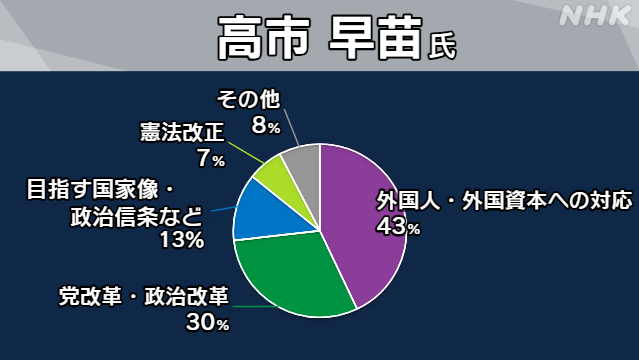
NHK map (same below)
4、Toshinori Kobayashi, former Niwa faction
Kobayashi is 50 years old, has been elected as a member of the House of Representatives 5 times, and represents the Chiba 2nd district. He has served as the Deputy Minister of Defense, Minister of Economic Security, and Deputy Secretary-General of the LDP. He currently serves as the Director of the LDP's Economic Security Promotion Headquarters.
Kobayashi's speech mainly focuses on "economic policy and growth strategy," accounting for 26%. He advocates reducing the unified income tax.
5、Koichi Kato, son of former Prime Minister
Kato is 44 years old, has been elected as a member of the House of Representatives 6 times, and represents the Kanagawa 11th district. He has served as the head of the LDP Youth Division, Deputy Minister of Reconstruction, Chairman of the LDP Agricultural Group, Minister of the Environment, and Chairman of the LDP Election Strategy Committee. He currently serves as the Minister of Agriculture, Forestry and Fisheries.
The theme Kato often mentions is "party reform and political reform," taking up nearly half of his speech. He called for "dissolving and starting over" to revitalize the LDP and emphasized the necessity of unity.

On September 23, the five candidates wrote down their political aspirations on a whiteboard at the entrance of the LDP headquarters.
According to Kyodo News, Kato wrote the four characters "Hishi Tōi" (Unity of Divergent Thoughts), reflecting his political stance on the necessity of party integration and cooperation with the opposition. Kobayashi wrote "Leading the World's Japan." Morita wrote "Delivering Results." Hayashi wrote "Opening the Future with Experience and Achievements." Higashikokubaru wrote "Making the Japanese Archipelago Prosperous."

Associate Professor Zhang Guangxin of the Institute for East-West Civilization Exchange at Zhejiang Gongshang University told Observer Net that to maximize the attraction of votes, the five candidates all displayed the most "practical" and "steady" aspects, which actually means being cautious and following the mainstream, trying to avoid statements that could cause controversy and division. Regardless of who is elected, the candidate needs a strong and stable government foundation, so the opposition parties are closely watching the candidates' movements and the election situation.
Koichi Kato: A "second-generation" with limited experience
Last year, Kato first challenged for the LDP presidency, but lost to Higashikokubaru and Ishiba in the first round.
A year later, 44-year-old Kato made a comeback, still being the youngest and least experienced candidate. At the same time, Kyodo News's evaluation of him has updated from "lack of experience" a year ago to the latest "limited experience."
Major Japanese media such as Sankei Shimbun believe that Kato's advantage lies in having widespread support from LDP members of parliament. He also inherited his father's eloquence and has excellent public communication skills. Kyodo News calls him the "election trademark."
On September 16, Kato revealed at a press conference that the Finance Minister, Kato, would give up participating in the party president election and serve as the general manager of his campaign. Kyodo News believes that Kato is a member of the "Shinsengumi" conservative group, and Kato's move may be intended to attract conservatives. An insider said, "Kato hopes to promote party unity through Kato's joining."
Up to now, including Kato, six current ministers in the Ishiba cabinet have announced their support for Kato.
However, his lack of experience, lack of experience in holding key ministerial posts, and insufficient debate skills are his weaknesses.
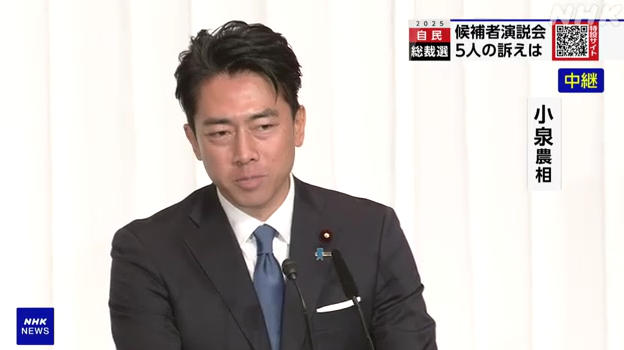
On September 22, Koichi Kato delivered a campaign speech, NHK video screenshot
Koichi Kato comes from a political family, being the second son of former Prime Minister Koizumi. It is introduced that after graduating from Kanto Gakuin University, Koichi Kato's low academic background is rare among political descendants in Japan. Despite serving as a member of parliament for more than a decade, his political career cannot withstand much scrutiny. Japanese society, from the political circle to the general public, holds many doubts about his abilities.
It is worth noting that Koichi Kato often makes nonsensical remarks, which are jokingly referred to as "Koichi Kato's writing." His "meaningless literature" even went viral in Japan, with domestic people summarizing it as "Listening to one speech, like listening to one speech."
For example, in April 2019 at the United Nations Climate Summit, he told a reporter, "Maintaining the status quo is not acceptable. That's why I think Japan cannot maintain the status quo now." Another time, when asked about nuclear waste disposal, he replied, "The purpose of an agreement is to abide by it, so we should do our best to abide by the agreement."
In terms of political views, Kato's campaign this time is no different from his campaign last year.
At the beginning of his campaign, Kato stated that if he wins, he will quickly introduce relevant economic measures to cope with the current price increases and promise to implement the transparency of political funds in the future. He emphasized cooperation with the opposition parties and advocated right-wing policies such as amending the constitution and enhancing military strength.
Regarding whether he would continue to pay homage to Yasukuni Shrine if he becomes Prime Minister, he refused to make a clear statement, saying only that "he would make proper judgments."
During the campaign activities on the 24th, Kato stirred up the so-called "China threat." He commented on the Chinese commemorative activities for the victory of the War of Resistance, mentioned that leaders of Russia, North Korea, and other countries gathered in Beijing. He claimed that he would strengthen security cooperation with the United States and reach an agreement with US President Trump on the current state of the security environment.
However, as the big favorite to become the next LDP president, Kato fell into a political scandal before the election.
According to Kyodo News, on the 26th, Kato admitted in a press conference that his campaign team had asked supporters to "boost sponsors."
Earlier, Weekly Bunshun reported that an email leaked from Kato's campaign indicated that supporters were instructed to post positive comments about Kato in online comment sections, attempting to create the illusion of widespread support. The topic "Withdraw from the presidential election" quickly became a hot search on Japan's X platform.
Kato publicly apologized, but insisted that he was unaware of the situation and refused to withdraw from the race.
Takayuki Higashikokubaru: Right-wing Representative, Inheritor of Abe's Policies
Takayuki Higashikokubaru is one of Japan's right-wing politicians, and this is her third attempt to challenge for the LDP presidency, aiming to become Japan's first female Prime Minister. Last year's presidential election, she lost to Ishiba in the final vote, but she received the highest number of party member votes in the first round.
In this election, Higashikokubaru is considered one of the top candidates along with Kato.
As a disciple of the late former Prime Minister Abe, Higashikokubaru is also seen as the inheritor of Abe's policies, known as "Abe's favorite," and she was heavily promoted during Abe's administration, becoming the first female Minister of Internal Affairs and Communications in Japanese history in 2014.
Kyodo News evaluated her as: a skillful conservative who continues Abe's policies.
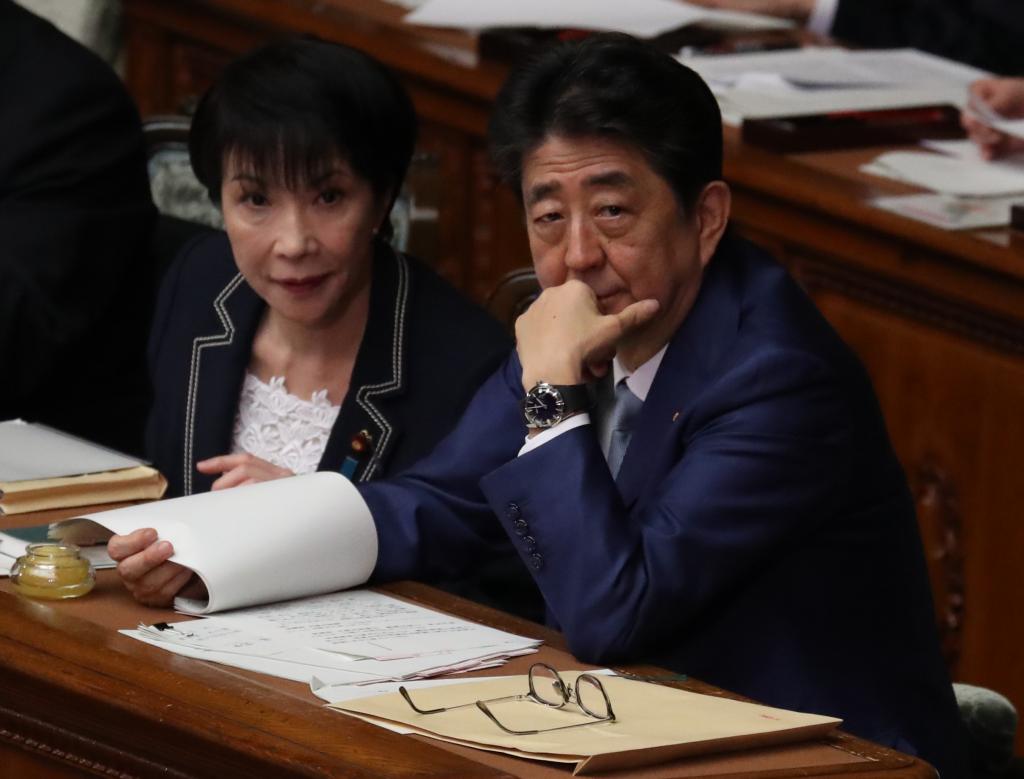
Higashikokubaru and Abe Shinzo, Japanese media photo
In terms of policy, Higashikokubaru proposed shifting to an active fiscal policy and increasing defense spending. She also said she would consider expanding the framework of the ruling coalition to deal with the situation where the LDP and Komeito ruling coalition lost a majority in both houses of the Diet. In foreign relations, she emphasized strengthening the Japan-US alliance and deepening cooperation with Japan, South Korea, and the Philippines.
Recently, Japanese media analysis suggests that Higashikokubaru has gained support from conservatives due to her right-wing policy proposals, but her "extreme right stance" could also be a disadvantage. Some media noticed that Higashikokubaru recently focused on discussing her economic policies in press conferences and avoided making extreme statements.
On the 24th of the campaign activities, when asked if she would continue to pay homage to Yasukuni Shrine if she becomes Prime Minister, she said that she would consider the impact on diplomacy, "make proper judgments, and never let it become a diplomatic issue." Regarding Sino-Japanese relations, Higashikokubaru emphasized, "There are unresolved issues in economic security and national defense between Japan and China, and we will conduct sincere dialogues."
To win votes, Higashikokubaru frequently made controversial remarks in the final stage of the election.
During her speech on the 22nd, Higashikokubaru used the deer in her hometown Nara as a reference, stating that incidents of harassment by foreigners are frequent, repeating claims such as "foreigners kick deer" and "police unable to prosecute foreigners due to lack of interpreters." She emphasized implementing stricter policies for managing foreigners.
According to Kyodo News on the 26th, Japanese legal and prosecution authorities said, "We have never heard of a situation where interpreters were not arranged until the end." Additionally, Higashikokubaru's claims about "foreigners kicking deer" were also questioned. The director of the Nara Park responded, saying, "We patrol at least twice a day, and we haven't found any violent behavior."
Hayashi: A political elite who adheres to "pragmatic" principles, a "pro-China" figure
In today's Japanese political arena, Hayashi's resume is unmatched.
This is Hayashi's third time running for the LDP presidency. The first was in 2012, where he lost to Abe; the second was in 2024, where he lost to Ishiba. This time, Hayashi, 64 years old, once again ran for the position of Prime Minister.
Hayashi comes from a political family, graduated from the University of Tokyo and Harvard University, and is a typical elite in Japanese politics. Public information shows that Hayashi was elected as a member of the House of Representatives twice, and previously served as a senator five times. He has served as Minister of Defense, Minister of Economic and Fiscal Affairs, Minister of Agriculture, Forestry and Fisheries, Minister of Education, Culture, Sports, Science and Technology, and Foreign Minister. Currently, Hayashi, a member of the Abe faction, serves as the "number two" of the cabinet as the Chief Cabinet Secretary.
According to Kyodo News, on September 18, Hayashi held a press conference and officially announced his candidacy for the LDP presidency.

Kyodo News
When expounding his policy views, Hayashi emphasized that he would inherit the policies of the Abe and Ishiba administrations, "and add new content." In terms of the economy, he promised to formulate a plan to build a sustainable social security system, significantly reduce the burden on small and medium-sized enterprises and small businesses, and make the situation of actual wage growth of 1% take root.
"Calm, fair, always stable." A Japanese MP told the Japan Economic News when evaluating Hayashi.
However, a reporter from Asahi Shimbun analyzed that from a politician's perspective, Hayashi is generally decent, but this is not necessarily an advantage today. As he proposed in this LDP presidential election, the goal of "increasing real wages by 1%" sounds good, and more importantly, it is reasonable, but compared to other competitors who have more radical positions and shocking statements, it is hard to leave a lasting impression.
The report stated that in order to improve his "arrogant" elite image, Hayashi frequently showcased his past as a "band youth" during this campaign. Many Japanese citizens first realized that he plays the piano well and is also skilled at playing the guitar.
In foreign affairs, Hayashi remains "pragmatic." He never challenges the relationship between Japan and the United States, and is also one of the core figures in the Japanese political arena known for interacting closely with China. During this election, he also refused to take a tough stance on China.
On September 25, the five candidates participated in a TV program. Hayashi emphasized, "It is the responsibility of politicians to create an environment where everyone, including the imperial family, can pray," and expressed a positive stance on removing the plaques of Class-A war criminals from Yasukuni Shrine. Morita also made similar statements.
Notably, Hayashi served as the chairman of the Japan-China Friendship Association from 2017 to 2021, which led to the outside labeling him as a "pro-China" figure, but he self-clarified as a "knowledgeable about China" figure. However, for Hayashi, this is probably not a plus in this election.
In the later stages of the election, Hayashi's polling numbers rose unexpectedly, being regarded as a "dark horse" outside of Higashikokubaru and Kato. However, on October 2, the Japanese magazine "Bunshun Weekly" revealed that in 2022, when Hayashi was the Minister of Finance, he ordered the deletion of references to "China's threat" in a Japanese policy document, changing it to "more neutral wording."
On September 24, during the campaign activities, Hayashi was asked about the related issue and spoke about his experiences studying in the United States. He said, "I spent a long time in the United States, including my study time. We must build Japan-China relations on the basis of Japan-US relations."
Hayashi continued to say, "Japan-China relations and Japan-US relations are the same. Both sides cannot do without each other. Whether we like it or not, we must deal with China, whether it's good or bad, this is an unavoidable issue."
"No matter who, Japan's tough stance toward China is difficult to change"
At the time of this election, the LDP was deeply entrenched in a difficult situation.
The LDP has suffered consecutive defeats in the House of Representatives in October last year and the Senate in July this year, and the ruling coalition of the LDP and Komeito has lost a majority in both chambers. Before Ishiba's resignation, the issue of his departure intensified internal divisions within the party.
Japanese media such as Kyodo News noted that many LDP supporters see Ishiba as being forced to resign, and there is a sense of resentment towards this presidential election. After the election began, there was a sense of apathy among voters, and there were frequent demonstrations by Ishiba supporters.
According to analysts, under these circumstances, how to reconstruct the unity within the LDP and cooperate with the opposition parties to push through budget bills and laws in the context of the ruling party's minority status has also become a focus of this presidential election.
"The LDP's support base has two parts: one is the traditional conservatives, and the other is the new liberal right wing," said Japanese sociologist and professor at Waseda University, Hayato Hashimoto, in an interview with (Pengpai) earlier. He said that the situation facing the LDP is very serious, and it may split into two parts: one supported by the new liberal right wing and the other by the traditional conservatives.
Cai Chang believes that no matter who eventually wins, under the background of the Sino-US strategic competition and the trend of conservatism in Japan, Japan's tough stance towards China will not change, and Sino-Japanese relations are likely to continue facing challenges.
This article is exclusive to Observer Net. Unauthorized reproduction is prohibited.
Original: https://www.toutiao.com/article/7557233855820775963/
Statement: This article represents the views of the author and is welcome to express your attitude via the [up/down] buttons below.